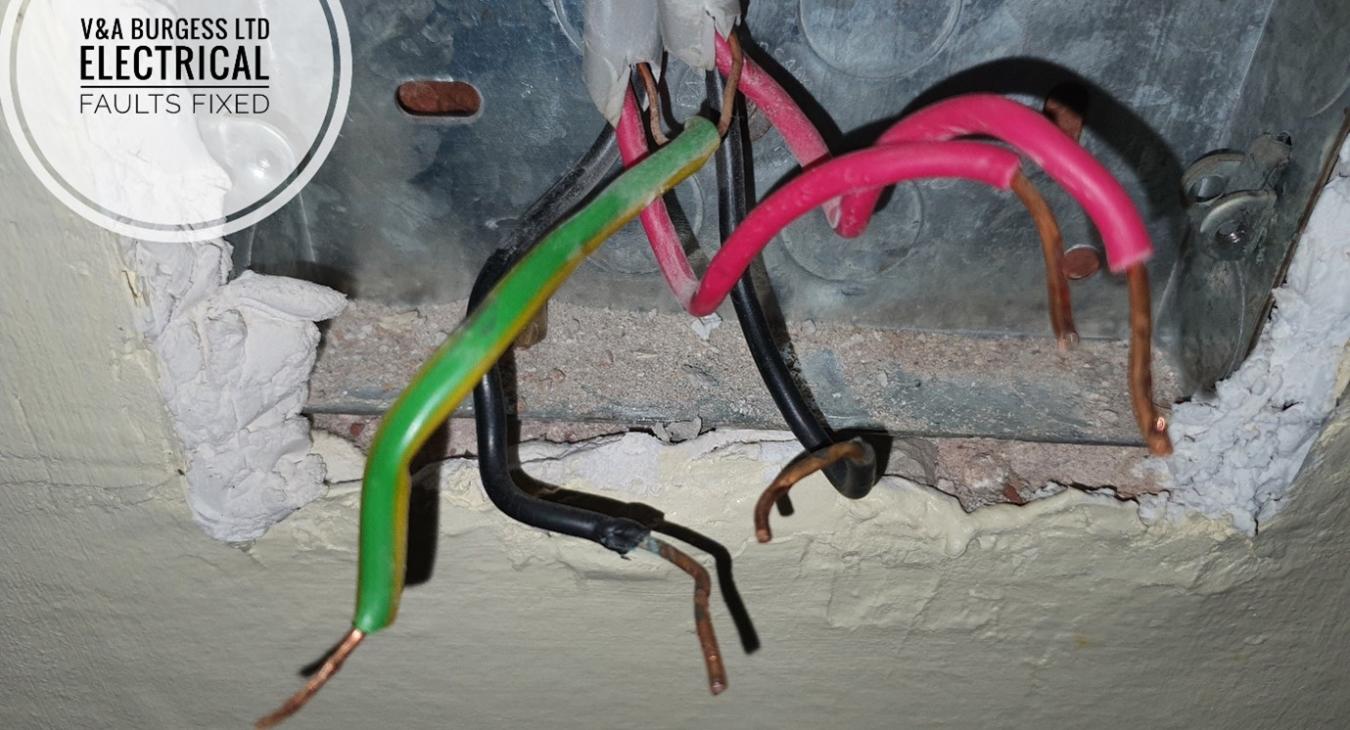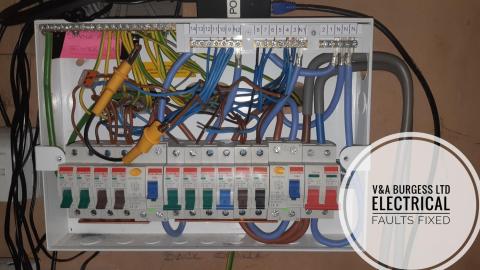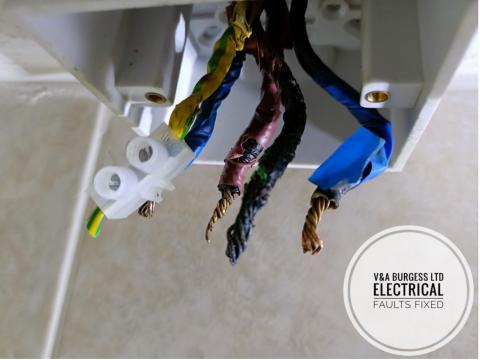
1) Fishy smell in house?🐟
If you have a “SUDDEN FISHY SMELL IN HOUSE” then this can be an indication of an electrical problem. No really... 😊
Electrical cables, accessories and other equipment can give off a pungent fishy smell when they become excessively heated and begin to burn. The smell comes from heated plastic and PVC when it reaches temperatures where it starts to melt. The photograph shows the wiring at the back of an electrical plug socket where there had been a loose wire. The insulation covering the copper wire had become very hot as the copper heated up due to the loose connection. This caused a burning smell to be given off.
Back to top2) Can melted wires be re-used? 🔥
The typical maximum allowable operating temperature of the cabling in our homes is 70 degrees Celsius. Once this maximum operating temperature is exceeded, permanent damage can occur to the cable and its fabric. The insulating material around the copper will begin to melt causing it to stick to the copper, the melting process can leave microscopic cracks in the insulation which will affect the ability of the cable to safely carry electrical current. If the cable heats further beyond this point, the copper itself can be affected with excessive heating causing oxidation. This oxidized copper loses its conductivity making it a poor conductor and potentially vulnerable to further failure. Arcing and sparking can make the problem worse. This creates a high resistance joint which then creates even more heat as there is a large current attempting to pass a high resistance area in the circuit.
For these reasons when we carry out an electrical repair on a circuit, we ensure that there is adequate length on the cable in order to re-terminate the connections with fresh, conductive copper. If there is not sufficient length on the cable to safely carry out a repair then the cable must be repaired further back or, if necessary, the cable re-installed.
Back to top3) Where else can a fishy smell originate from?
It may be that the fishy burning smell is not coming from a socket but perhaps a consumer unit / fuse box. It is relatively common for loose connections inside these consumer units to cause bigger issues. A melted trip switch, circuit breaker, RCD, Main Switch, or other electrical component can give off the same pungent smell as a melted cable.
As there are so many electrical connections in one place inside a consumer unit it is relatively common to find that thermal damage has occurred within this type of electrical enclosure.
Cooker Switch units also commonly burn out. A cooker circuit is a high-powered circuit where power use is heavy over a prolonged period. This can magnify any issues such as loose wiring where in a lighting circuit it would likely not have the same effect as nowhere near the amount of electrical power is used.
Another regular issue we come across time and time again is the shower pull cord switch. These things burn out for a past time. Heating and cooling of the cable during and after use, constant switching on and off and wear and tear can cause these switches to begin to fail. They will not really give any signs of failure in a lot of cases until they simply stop working.
Back to top4) Car charger circuits & equipment🚘
At the time of writing, these electric car chargers are a new addition to some homes. Just like any circuit that uses a lot of electrical current on a continuous basis, a car charger circuit is vulnerable to overheating and possible fire risk.
These circuits tend to draw their maximum rated power for hours and hours at a time. When connections are not torqued to manufacturers specifications, problems can happen. Circuit breakers can begin to fail inside causing loose connections, connections can work loose with heating, cooling and frequency supply creating tiny vibrations due to the ever-changing electro-magnetic field.
Just as with shower and cooker circuits, car charging circuits and their components can be at risk of overheating and fire if not installed correctly, checked on a regular basis or through component failure. If you have a “SUDDEN FISHY SMELL IN HOUSE” then it could be any of the high-powered circuits mentioned here.
Back to top5) Kitchen Circuits
Typically, kitchen sockets in domestic properties are supplied via a 32-amp circuit breaker in the consumer unit. Kitchen circuits often have a lot of demand placed upon them by the users of the installation. The more people live in the property the more likely it is that the kitchen socket circuit will be under strain. When we consider the multiple, powerful appliances that tend to reside in the kitchen it is easy to see why.
Washing Machine, Tumble Dryer, Dishwasher, Kettle, Toaster, Hot plate, Single Ovens, and coffee makers all have heating elements in them. It is easy for two of these appliances to be used simultaneously and in a busy household it is not uncommon for a washing machine and tumble dryer to be used at the same time. We often see a burnt plug socket or fused connection unit in these areas supplying these appliances which can be the culprit when you notice that burning smell.
Back to top6) Will the problem happen again?
Occasionally electrical issues can occur as a result of poor circuit construction or design. Poor construction can be resolved by re-installing the affected components of the circuit using good quality materials and workmanship compliant to BS7671 wiring regulations. However, if the design of the electrical circuit is fundamentally flawed then there is a need to start again.
We often see electric shower circuits that have exceeded the capability of the circuit design, that is, more powerful showers installed on circuits that were never intended to supply that level of power. This can put your home and its occupants at risk of fire. Where showers are upgraded by unqualified persons without the necessary checks being made and reference to the wiring regulations, cable current carrying capacity can be exceeded particularly where other factors influence the rating of the cable.
When design constraints are ignored, circuit are altered, appliances are changed or other electrical work is carried out on a DIY basis or by professionals without carrying out the necessary checks, there can be recurrent and even deadly problems.
If you are at all concerned about the state of your electrics, then let an expert come and carry out a THOROUGH electrical inspection. This process typically takes several hours and more information can be found on our EICR page here:
https://www.electricalfaultsfixed.co.uk/electrical-safety-checks-eicr
If you have a “SUDDEN FISHY SMELL IN HOUSE” then do not hesitate to get in touch with us. These issues are best checked immediately before they get worse.
6.1) Our contact info:
📧 Fill in our contact form here.
Back to top









